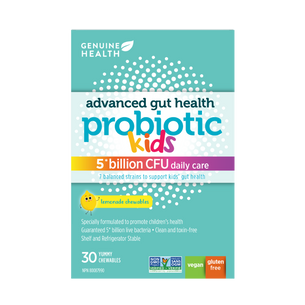Protect Your Child’s Eyes From Blue Light with This Nutrient

Here’s a mind-blowing fact: Most of today’s kids, will experience more screen time than any other generation.
Smartphones, video entertainment, online educational and academic resources, the decline of print media – screens are taking over and becoming indispensable cogs turning the wheels of modern society. My two year old daughter’s generation won’t know a life before Internet, Netflix, Alexa, drones, Amazon Prime or social media. If watches and glasses are google-enabled – what’s next?
As parents, we want to do our best to protect our kids from the social, emotional and mental impacts of technology – but there are also physiological ones.
We’ve all heard of “blue light” and maybe you have seen the slew of influencers on social media rocking blue light blocking/filtering glasses. Fortunately, we’re all beginning to understand the impact that blue light has on our vision, its effects on our sleep-wake cycle (aka circadian rhythms), as well as anxiety and depression.
Neuroscientists are just recently uncovering the effects blue light has on us. Why? Because blue light isn’t an evolutionary adaptation – it came on suddenly, without any previous connection to nature (i.e. our body has no physiological precedent for this sensory input). Neither our eyes or brain can interpret blue light by calling on previous experience – it’s totally foreign to the human body.
As always, there are ways to limit exposure, but diet and supplementation can also help to support healthy function of our children’s brains and our eyes – two very valuable assets!
One important nutrient to look to is lutein. Lutein is a powerful antioxidant and phytonutrient, found most concentrated in dark, leafy green vegetables like kale and spinach.
Our body does not produce lutein on its own, so it is therefore considered to be an essential nutritional component, meaning we must get it through diet or supplementation.
Lutein has been shown to support eye health! Thorough research confirms its impact on ocular health (along with lutein’s naturally concentrated presence within the eye’s retina and macula).
So, what does this have to do with our kids and screen time? In recent years, lutein’s impact on ocular health has expanded to cover the effects of blue light on both the lens of the eye and the retina. Lutein has been shown to reduce the phototoxic damage to photoreceptor cells in the eye, which can be caused by blue light. At night time, the potential for damage to photoreceptors is even greater and will also impact that sleep-wake cycle as mentioned above. And as parents are acutely aware, when children don’t get the proper amount or quality of sleep, their behavior, ability to learn and communicate are impacted greatly.
Children are more vulnerable to the influence of nearly everything and their exposure to technology to environmental toxins is greater than any previous generation. And while we can’t prevent them from screen exposure as they grow, we can do our part to give them the nutrition that they need to combat its effects.
In providing nutritious options for them, we set them up for current AND future health.
So, there are a few take-home messages here:
Information provided by Dr. Katherine Kremblewski, ND is intended to be general in nature, and should not be used as a substitute for a visit with a Naturopathic Doctor or Family Doctor. The advice is intended to offer only a general basis for individuals to discuss their medical condition with their health care provider. Always consult your licensed Naturopathic Doctor or health care provider.
References:
https://www.ncbi.nlm.nih.gov/pmc/articles/PMC4698938/
https://www.ncbi.nlm.nih.gov/pubmed/18839521
https://www.ncbi.nlm.nih.gov/pubmed/16740060/
Smartphones, video entertainment, online educational and academic resources, the decline of print media – screens are taking over and becoming indispensable cogs turning the wheels of modern society. My two year old daughter’s generation won’t know a life before Internet, Netflix, Alexa, drones, Amazon Prime or social media. If watches and glasses are google-enabled – what’s next?
As parents, we want to do our best to protect our kids from the social, emotional and mental impacts of technology – but there are also physiological ones.
We’ve all heard of “blue light” and maybe you have seen the slew of influencers on social media rocking blue light blocking/filtering glasses. Fortunately, we’re all beginning to understand the impact that blue light has on our vision, its effects on our sleep-wake cycle (aka circadian rhythms), as well as anxiety and depression.
Neuroscientists are just recently uncovering the effects blue light has on us. Why? Because blue light isn’t an evolutionary adaptation – it came on suddenly, without any previous connection to nature (i.e. our body has no physiological precedent for this sensory input). Neither our eyes or brain can interpret blue light by calling on previous experience – it’s totally foreign to the human body.
As always, there are ways to limit exposure, but diet and supplementation can also help to support healthy function of our children’s brains and our eyes – two very valuable assets!
One important nutrient to look to is lutein. Lutein is a powerful antioxidant and phytonutrient, found most concentrated in dark, leafy green vegetables like kale and spinach.
Our body does not produce lutein on its own, so it is therefore considered to be an essential nutritional component, meaning we must get it through diet or supplementation.
Lutein has been shown to support eye health! Thorough research confirms its impact on ocular health (along with lutein’s naturally concentrated presence within the eye’s retina and macula).
So, what does this have to do with our kids and screen time? In recent years, lutein’s impact on ocular health has expanded to cover the effects of blue light on both the lens of the eye and the retina. Lutein has been shown to reduce the phototoxic damage to photoreceptor cells in the eye, which can be caused by blue light. At night time, the potential for damage to photoreceptors is even greater and will also impact that sleep-wake cycle as mentioned above. And as parents are acutely aware, when children don’t get the proper amount or quality of sleep, their behavior, ability to learn and communicate are impacted greatly.
Children are more vulnerable to the influence of nearly everything and their exposure to technology to environmental toxins is greater than any previous generation. And while we can’t prevent them from screen exposure as they grow, we can do our part to give them the nutrition that they need to combat its effects.
In providing nutritious options for them, we set them up for current AND future health.
So, there are a few take-home messages here:
- Incorporate plenty of fresh fruits and veggies into their diet – in a wide variety.
- Shut down screen-time at least 2 hours before bedtime.
- Supplement kids with high quality nutritional products that include healthy omega-3 fats and concentrated phytonutrients – especially the eye-health focused carotenoid, lutein. Find it in Genuine Health’s omega3 kids + D3, which delivers 5 mg of lutein derived from marigolds, plus EPA and DHA from wild caught fish in a ratio that supports your child’s health, and 600 IU of vitamin D3 to support healthy development of your child’s brain, eyes and nerves.
Information provided by Dr. Katherine Kremblewski, ND is intended to be general in nature, and should not be used as a substitute for a visit with a Naturopathic Doctor or Family Doctor. The advice is intended to offer only a general basis for individuals to discuss their medical condition with their health care provider. Always consult your licensed Naturopathic Doctor or health care provider.
References:
https://www.ncbi.nlm.nih.gov/pmc/articles/PMC4698938/
https://www.ncbi.nlm.nih.gov/pubmed/18839521
https://www.ncbi.nlm.nih.gov/pubmed/16740060/


















































